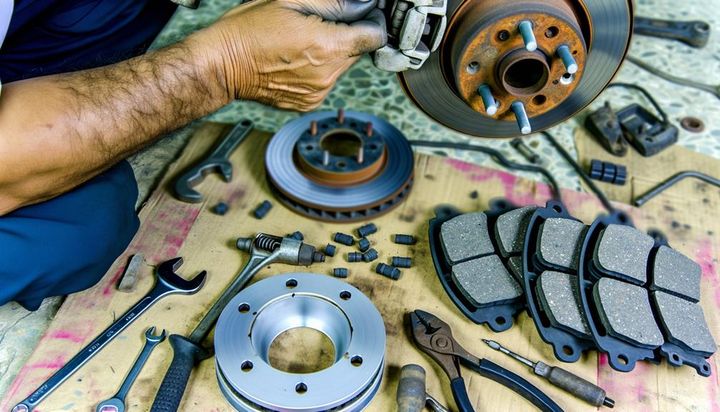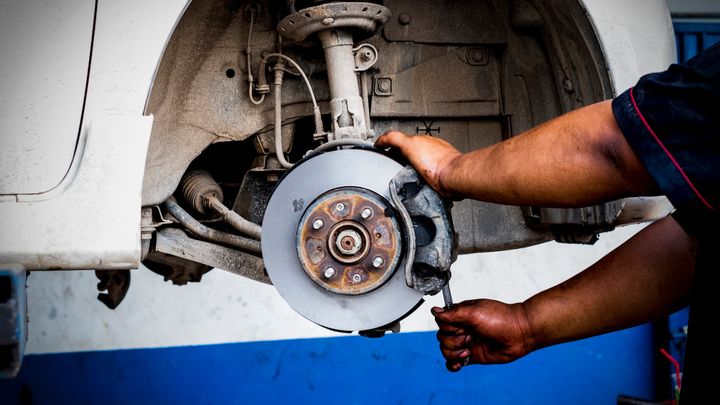


Experiencing a popping or clicking sound when applying the brakes can be a concerning issue for any driver. This noise often indicates an underlying problem with your vehicle's brake system or suspension components, which, if left unaddressed, could lead to further damage and potential safety hazards on the road. In this comprehensive guide, we will explore the various causes of a popping sound when braking, provide diagnostic techniques to pinpoint the source, and offer step-by-step repair instructions to resolve the issue effectively. Additionally, we will discuss preventive maintenance practices to help ensure your brakes remain in optimal condition.

Brakes are one of the most critical safety components in a vehicle, and any unusual noises or behaviors should be promptly investigated. A popping sound when braking can stem from various issues, ranging from loose or worn brake components to suspension problems or even parking brake cable issues. Understanding the potential causes and taking appropriate action is crucial to maintaining the integrity of your braking system and ensuring a safe driving experience.
The popping sound when braking can originate from different parts of the vehicle's brake system or suspension components. Let's explore the common causes in detail.
Brake system issues that can cause a popping sound when braking include:
| Cause | Description |
|---|---|
| Loose Brake Pads | If the brake pads are not securely fastened to the caliper bracket, they can shift or jump when you apply the brakes, resulting in a clicking or popping noise. This issue is particularly common at low speeds when the pads have more room to move. |
| Worn Brake Pad Shims or Anti-Rattle Clips | Brake pads are engineered with a small amount of clearance to allow for expansion when heated during braking. Shims or anti-rattle clips are installed to keep the pads in place and prevent excessive movement. When these components become worn or missing, the brake pads can move erratically, causing a popping sound as they make contact with the rotor. |
| Loose or Worn Brake Caliper Bolts/Brackets | The brake caliper is a crucial component that houses the brake pads and applies pressure to the rotor during braking. It is secured to the vehicle by guide pins and bolts. If these bolts or brackets become loose or worn over time, the caliper can bounce erratically, leading to a popping or clicking noise when braking. |
| Brake Fluid Leaks or Air in the Brake Lines | The brake fluid system is a closed, pressurized system that transfers the force from the brake pedal to the calipers. If there is a leak in the system or air has entered the brake lines, it can cause pressure fluctuations, resulting in a popping or hissing sound when applying the brakes. |
The suspension system plays a vital role in maintaining proper contact between the tires and the road surface, ensuring optimal braking performance. Issues with the suspension components can cause the vehicle to nosedive during braking, leading to a popping or clunking sound.
| Cause | Description |
|---|---|
| Worn Bushings | Bushings are rubber or polyurethane components that provide a cushion between the suspension components and the vehicle's frame. When these bushings become worn or deteriorated, they can allow excessive movement, causing the suspension to shift and potentially create a popping noise during braking. |
| Damaged Ball Joints | Ball joints are pivoting components that connect the suspension control arms to the wheels. If these joints become worn or damaged, they can cause the suspension to move erratically, resulting in a popping or knocking sound when braking. |
| Faulty Struts | Struts are an essential part of the suspension system, responsible for dampening the impact of bumps and maintaining proper vehicle height. Worn or leaking struts can cause the vehicle to nosedive during braking, leading to a popping or clunking sound. |
Other potential causes of a popping sound when braking include:
Parking Brake Cable Issues: The parking brake cable is connected to the rear brakes and can sometimes cause a popping noise if it becomes loose or worn. As the cable moves within its brackets or suspension components, it can create a popping sound when braking.
CV Joint Problems: Constant velocity (CV) joints are responsible for transferring power from the transmission to the wheels while allowing for the up-and-down movement of the suspension. Damaged or worn CV joints can cause a popping noise when accelerating, turning, or braking.
To effectively address the popping sound when braking, it is crucial to accurately diagnose the source of the issue. Here are some steps you can take to pinpoint the cause:

Begin by conducting a thorough visual inspection of the brake components and suspension system. Look for any signs of looseness, wear, or damage that could contribute to the popping sound. Pay close attention to the following components:
Brake pads
Calipers
Bolts and brackets
Suspension components (bushings, ball joints, struts)
While the vehicle is stationary, apply the brakes and listen carefully to determine if the sound is coming from the front or rear of the vehicle. Additionally, try to identify if the noise is originating from the left or right side. This information can help narrow down the potential source of the issue.
To further isolate the cause, try to recreate the popping sound by applying the brakes under different conditions:
Apply the brakes at different speeds (low, medium, high)
Brake while turning
Brake after driving over bumps or uneven surfaces
Some issues may only manifest under specific conditions, such as low speeds or during turns, which can provide valuable clues about the underlying problem.
Once you have identified the potential cause of the popping sound when braking, it's time to take the necessary repair steps. Here are some common repairs you may need to perform:
Replace worn brake pads, shims, and hardware: If the brake pads, shims, or anti-rattle clips are worn or damaged, they should be replaced with new components. Ensure that the new pads are properly installed and secured to prevent any future popping or clicking noises.
Tighten or replace loose caliper bolts or brackets: If the caliper bolts or brackets are loose, tighten them to the manufacturer's recommended torque specifications. If they are excessively worn or damaged, it may be necessary to replace them with new components.
Repair any brake fluid leaks: Inspect the brake fluid system for any leaks and repair them promptly. Leaks can cause air to enter the system, leading to pressure fluctuations and popping sounds.
Bleed brake lines to remove air: If air has entered the brake lines, it is essential to bleed the system to remove any trapped air. Air in the lines can cause a spongy brake pedal and contribute to popping or hissing noises when braking.
Replace worn bushings, ball joints, and struts: If the suspension components, such as bushings, ball joints, or struts, are worn or damaged, they should be replaced with new parts. Worn suspension components can cause excessive movement and lead to a popping sound during braking.
Adjust or replace the parking brake cable: If the parking brake cable is loose or worn, it may need to be adjusted or replaced to eliminate any popping noises caused by its movement within the brackets or suspension components.
Replace damaged CV joints or axles: If the CV joints or axles are damaged or worn, they should be replaced to prevent popping noises during acceleration, turning, or braking.
To minimize the likelihood of experiencing a popping sound when braking and ensure the longevity of your vehicle's brake and suspension systems, it is essential to follow a regular preventive maintenance schedule. Here are some recommended practices:
Follow the manufacturer's recommended maintenance schedule for brake and suspension component inspections and replacements.
Ensure that brake pads, shims, and hardware are properly installed during replacements to prevent looseness or excessive movement.
Regularly check and replace worn suspension components, such as bushings, ball joints, and struts, to maintain proper alignment and prevent excessive movement.
Lubricate brake components as recommended by the manufacturer to ensure smooth operation and prevent premature wear.
While some brake and suspension repairs can be performed by experienced DIYers, it is often advisable to seek professional help, especially if you lack the necessary skills, tools, or experience. A qualified mechanic has the expertise and equipment to properly diagnose and repair the issue, ensuring your vehicle's safety and preventing further damage.
Attempting complex repairs without the proper knowledge or tools can potentially lead to more significant problems and costly repairs down the line. In cases where you are unsure about the cause or the repair process, it is always better to have a professional mechanic diagnose and address the issue.
A popping sound when braking should never be ignored, as it can indicate a potential problem with your vehicle's brake system or suspension components. By promptly addressing the issue and following proper maintenance practices, you can ensure your vehicle's safety and prevent more costly repairs in the future. If you lack the necessary expertise or are unsure about the cause of the popping sound, it is advisable to seek professional assistance from a qualified mechanic to diagnose and repair the problem correctly.
Brake dive and nose dive refer to the same phenomenon where the front end of the vehicle dips significantly during braking due to excessive weight transfer to the front wheels. It is an undesirable situation that can compromise brake performance and stability.
Excessive unsprung weight, which refers to the weight of the components not supported by the suspension springs, can make it harder to stop the vehicle quickly as it increases the inertia that needs to be overcome during braking.
Yes, suspension springs can be adjusted or replaced with stiffer springs to reduce brake dive and improve weight distribution during braking. However, this should be done carefully to maintain a balance between ride comfort and brake performance.
Shock absorbers work in conjunction with suspension springs to control the suspension movement during braking. Upgrading shock absorbers can help improve brake performance by minimizing excessive weight transfer and maintaining stability.
Suspension geometry, which includes factors like camber, caster, and toe angles, can influence weight distribution and tire contact with the road during braking. Adjusting suspension geometry can optimize brake performance by ensuring even weight distribution and maximizing tire grip.
Yes, upgrading the brake system itself, such as using larger brake rotors, high-performance brake pads, or better brake calipers, can complement suspension improvements and further enhance overall brake performance.
Regular maintenance of the suspension system, including inspecting and replacing worn-out components, ensuring proper alignment, and maintaining correct fluid levels, can help maintain optimal brake performance by ensuring stability and control during braking.
Yes, there can be trade-offs between optimizing suspension for ride comfort and brake performance. Stiffer suspension settings that improve brake performance may compromise ride comfort, and vice versa. Finding the right balance is crucial.
Yes, vehicle weight and load distribution can affect the impact of suspension on brake performance. Heavier vehicles or uneven load distribution can exacerbate issues like brake dive and make it more challenging to maintain stability during braking.
Yes, advanced suspension technologies like adaptive or semi-active suspension systems can dynamically adjust suspension settings based on driving conditions, potentially improving both ride comfort and brake performance by optimizing weight distribution and stability during braking.

Sarah isn't your average gearhead. With a double major in Mechanical Engineering and Automotive Technology, she dived straight into the world of car repair. After 15 years of turning wrenches at dealerships and independent shops, Sarah joined MICDOT to share her expertise and passion for making cars run like new. Her in-depth knowledge and knack for explaining complex issues in simple terms make her a valuable asset to our team.











